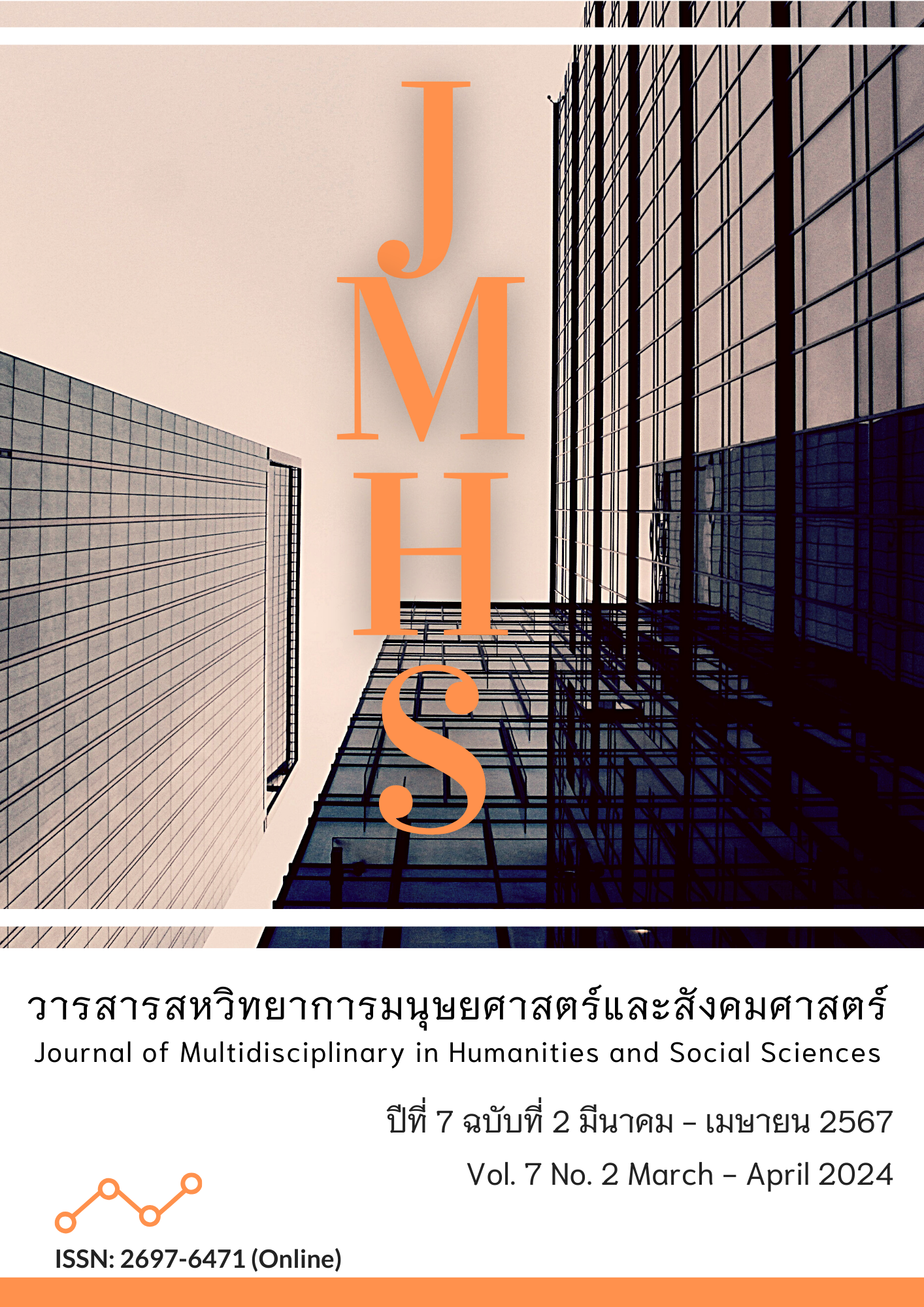A Model of Servant Leadership According to Sangahavatthu Principles for School Administrators under Bangkok Metropolitan Administration
Main Article Content
Abstract
This article aimed to 1) study the needs and necessities of servant leadership among educational institution administrators under the jurisdiction of Bangkok Metropolitan Administration; 2) develop a servant leadership model based on the 4 principles of Sangahavatthu for educational institution administrators under the jurisdiction of Bangkok Metropolitan Administration; and 3) evaluate the servant leadership model according to the 4 principles of Sangahavatthu for educational institution administrators under Bangkok Metropolitan Administration. It was mixed methods research. There were 3 research steps: step 1 was to study the needs and necessities for servant leadership among educational institution administrators by using a questionnaire on a sample of 370 teachers, and the data were analyzed by using basic statistics, namely, percentage, mean, standard deviation, and the index of essential needs (PNImodified); step 2 was to develop a model by interviewing 10 key-informants and organizing a group discussion with 9 experts. The research tools were an interview form and question guidelines for group discussion. The data were analyzed by using content analysis; and step 3 was to evaluate the model by using an evaluation form for a sample of 205 executives, and the data were analyzed by using basic statistics, namely, percentage, mean, and standard deviation.
The results of the study found that: 1. The need for servant leadership among educational institution administrators under the Bangkok Metropolitan Administration overall with an index of essential needs (PNImodified) was between 0.052-0.076; 2. A servant leadership model according to the 4 principles of Sangahavatthu for educational institution administrators under the Bangkok Metropolitan Administration consists of 5 elements; and 3. Evaluation of the servant leadership model according to the 4 principles of Sangahavatthu for educational institution administrators under Bangkok Metropolitan Administration overall, the evaluation results were at the highest level in all 4 areas, ordered from highest to lowest, namely: Usefulness, Correctness, Appropriateness, and Possibility respectively. In summary, the research knowledge is concluded into SASA: S (servant leadership), A (awareness), S (sangahavatthu), and A (application).
Article Details

This work is licensed under a Creative Commons Attribution-NonCommercial-NoDerivatives 4.0 International License.
Views and opinions appearing in the Journal it is the responsibility of the author of the article, and does not constitute the view and responsibility of the editorial team.
References
ณฤดีณัฏฐา รัตนกระจ่างศิลป์. (2564). รูปแบบการบริหารตนตามหลักฆราวาสธรรม สำหรับผู้บริหารสถานศึกษา สังกัดสำนักงานเขตพื้นที่การศึกษามัธยมศึกษา เขต 3 พระนครศรีอยุธยา(ดุษฎีนิพนธ์พุทธศาสตรดุษฎีบัณฑิต). มหาวิทยาลัยมหาจุฬาลงกรณราชวิทยาลัย.
บุญชม ศรีสะอาด. (2535). การวิจัยเบื้องต้น. (พิมพ์ครั้งที่ 5). กรุงเทพฯ: สุวีริยาสาส์นการพิมพ์.
พระพรหมคุณาภรณ์ (ป.อ. ปยุตฺโต). (2550). ธรรมนูญชีวิต. กรุงเทพฯ: พิมพ์สวย.
พระพรหมคุณาภรณ์ (ป.อ. ปยุตฺโต). (2554). พจนานุกรมพุทธศาสน์ ฉบับประมวลศัพท์. (พิมพ์ครั้งที่ 16). กรุงเทพฯ: สหธรรมิก.
มหาจุฬาลงกรณราชวิทยาลัย. (2539). พระไตรปิฎกภาษาไทยฉบับมหาจุฬาลงกรณราชวิทยาลัย. กรุงเทพฯ: โรงพิมพ์มหาจุฬาลงกรณราชวิทยาลัย.
วศิน อินทสระ. (2554). หลักธรรมอันเป็นหัวใจพระพุทธศาสนา. (พิมพ์ครั้งที่ 2). กรุงเทพฯ: ธนธัชการพิมพ์.
วิโรจน์ สารรัตนะ. (2557). ภาวะผู้นำ ทฤษฎีและนานาทัศนะร่วมสมัยปัจจุบัน. กรุงเทพฯ: ทิพย์วิสุทธิ์.
สัมฤทธิ์ กางเพ็ง และ สรายุทธ กันหลง. (2553). ภาวะผู้นำใฝ่บริการในองค์การ: แนวคิด หลักการ ทฤษฎี และงานวิจัย. (พิมพ์ครั้งที่ 2). ขอนแก่น: โรงพิมพ์คลังนานาวิทยา.
สำนักงานปลัดกระทรวงศึกษาธิการ. (2559). แผนพัฒนาการศึกษาของกระทรวงศึกษาธิการฉบับที่ 12 (พ.ศ. 2560-2564). กรุงเทพฯ: กระทรวงศึกษาธิการ.
สุวิมล ว่องวาณิช. (2558). การวิจัยประเมินความต้องการจำเป็น. (พิมพ์ครั้งที่ 3). กรุงเทพฯ: สำนักพิมพ์แห่งจุฬาลงกรณ์มหาวิทยาลัย.
อมรา กาฬสมุทร, เก็จกนก เอื้อวงศ์ และ พิชิต ฤทธิ์จรูญ. (2565). ความสัมพันธ์ระหว่างภาวะผู้นำใฝ่บริการของผู้บริหารสถานศึกษากับบรรยากาศองค์การของสถานศึกษาสังกัดสำนักงานเขตพื้นที่การศึกษาประถมศึกษาชุมพร เขต 2. วารสารมหาวิทยาลัยราชภัฏมหาสารคาม, 16(1), 162-174. สืบค้นจาก https://so05.tci-thaijo.org/index.php/rmuj/article/view/258506
อัญชิสา ชูศรี, สิน งามประโคน และ อำนาจ บัวศิริ. (2562). รูปแบบการพัฒนาภาวะผู้นำใฝ่บริการ สำหรับนักศึกษาพยาบาล วิทยาลัยพยาบาล กระทรวงสาธารณสุข. วารสารมหาจุฬานาครทรรศน์, 6(6), 2953-2970.สืบค้นจาก https://so03.tci-thaijo.org/index.php/JMND/article/view/202214
Blanchard, K. H. (2006). Leading At a Higher Level: Blanchard on Leadership and Creating High Performing Organizations. New Jersey: Prentice Hall.
Damnoen, P. S., Siri, P., Supattho, P. S., & Kaewwilai, K. (2021). The Development of Student Characteristics in According to the Nawaluk Framework of the Buddhist Integration of Buddhapanya Sri Thawarawadee Buddhist College. Asia Pacific Journal of Religions and Cultures, 5(2), 126–135. Retrieved from https://so06.tci-thaijo.org/index.php/ajrc/article/view/249662
Greenleaf, R. K. (1997). Servant Leadership. Illinois: The Robert L. Greenleaf Center.
Klomkul, L., Damnoen, S., Sawasdee, U., & Wilairadtanakun, A. (2023). Network Development of Buddhist Communication Innovative Space For Media Literacy of Thai Youths. Journal of Namibian Studies: History Politics Culture, 35, 919-935. https://doi.org/10.59670/jns.v35i.3381
Krejcie, R. V. & Morgan, D. W. (1970). Determining Sample Size for Research Activities. Educational and Psychological Measurement, 30(3), 607-610.
Phumphongkhochasorn, P., Damnoen, S., Tuwanno, D. M., Srichan, P. W., & Udomdhammajaree, P. (2022). Educational Quality Assurance and School Management Standards According to International. Asia Pacific Journal of Religions and Cultures, 6(1), 1–16. Retrieved from https://so06.tci-thaijo.org/index.php/ajrc/article/view/244349
Sallis, E. (2002). Total Quality Management in Education. (3rd ed.). London: Kogan Page.
Spears, L. C. (1998). Insights On Leadership: Service, Stewardship, Spinit, and Servant-Leadership. New York: John Wiley & Sons.
Tan, C. C., & Damnoen, P. S. (2020). Buddhist Noble Eightfold Path Approach in the Study of Consumer and Organizational Behaviors. Journal of MCU Peace Studies, 8(1), 1–20. Retrieved from https://so03.tci-thaijo.org/index.php/journal-peace/article/view/235080


